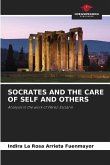Up to now "philosophy" is thought to be the science of the most general laws of the development of nature, human society and thinking. Aristotle understood it this way nearly 2,500 years ago, considering philosophy "a science of knowing certain foundations and beginnings.... The correct name for philosophy is truth," he said, "for the aim of theorizing is truth, the aim of practice is doing. The German philosopher Edmund Husserl, closer to our time, held precisely the same opinion about philosophy, regarding it as "a science of true beginnings, of sources... And, - he wrote at the beginning of this century, - if we imagine it in ideal completeness, it will be the reason itself, which along with itself and above itself cannot have any authority. This is how many great philosophers understood philosophy, considering it the highest achievement of mankind. And the point here is not to pose some profound question, but to be able to answer it - and to answer it "scientifically, i.e., in a way that is obligatory for every reasonable person.
Bitte wählen Sie Ihr Anliegen aus.
Rechnungen
Retourenschein anfordern
Bestellstatus
Storno








